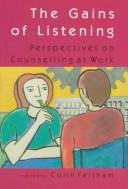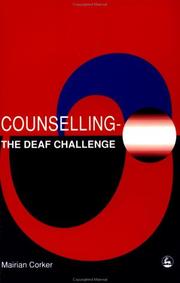
ISBN: 0335192815 0335192807 9780335192809 Year: 1997 Publisher: Buckingham ; Philadelph, Pa. : Open University Press,
Abstract | Keywords | Export | Availability | Bookmark
 Loading...
Loading...Choose an application
- Reference Manager
- EndNote
- RefWorks (Direct export to RefWorks)
Employees --- Personnel --- Counseling of. --- Counseling --- Employees - Counseling of.
Book
ISBN: 1544304064 1483328813 Year: 2004 Publisher: Thousand Oaks, California : SAGE Publications, Inc,
Abstract | Keywords | Export | Availability | Bookmark
 Loading...
Loading...Choose an application
- Reference Manager
- EndNote
- RefWorks (Direct export to RefWorks)
Counseling Criminal Justice Offenders' offers individuals a practical preparation for communicating with offenders. The book gives essential information, proven systems that have stood the test of time in American prisons and appropriate and effective counsellor attitudes.
Criminals --- Criminals --- Criminals --- Counseling of. --- Counseling of --- Rehabilitation.
Book
ISBN: 1599474921 Year: 2016 Publisher: West Conshohocken, [Pennsylvania] : Templeton Press,
Abstract | Keywords | Export | Availability | Bookmark
 Loading...
Loading...Choose an application
- Reference Manager
- EndNote
- RefWorks (Direct export to RefWorks)
"Does religion belong in psychotherapy? For anyone in the helping profession, whether as mental health professionals or religious leaders, this question is bound to arise. Many mental health professionals feel uncomfortable discussing religion, while many religious leaders feel uncomfortable referring their congregants to professionals who have no knowledge of their faith, nor intent to engage with it. And yet Michelle Pearce, PhD, assistant professor and clinical psychologist at the Center for Integrative Medicine at the University of Maryland, argues that if religion is important to a client, then religion will be a part of psychotherapy, whether it is discussed or not. Clients cannot check their values at the door any more than the professionals who treat them. To Pearce, the question isn't really "does religion belong?" but rather "how can mental health professionals help their religious clients engage with and use their faith as a healing resource in psychotherapy?" Cognitive Behavioral Therapy for Christian Clients with Depression is the answer to that question, as the book's purpose is to educate mental health professionals and pastoral counselors about religion's role in therapy, as well as equip them to discuss religious issues and use evidence-based, religiously-integrated tools with Christian clients experiencing depression. In this book, readers will find the following resources in an easy-to-use format: An overview of the scientific benefits of integrating clients' religious beliefs and practices in psychotherapy An organizing therapeutic approach for doing Christian CBT Seven tools, specific to Christian CBT, to treat depression Suggested dialogue for therapists to introduce concepts and tools Skill-building activity worksheets for clients Clinical examples of Christian CBT and the 7 tools in actionPractitioners will learn the helpful (and sometimes not so helpful) role a person's Christian faith can play in psychotherapy, and will be equipped to discuss religious issues and use religiously-integrated tools in their work. At the same time, clergy will learn how Christianity can be integrated into an evidence-based secular mental health treatment for depression, which is sure to increase their comfort level for making referrals to mental health practitioners who provide this form of treatment. Cognitive Behavioral Therapy for Christian Clients with Depression is a practical guide for mental health professionals and pastoral counselors who want to learn how to use Christian-specific CBT tools to treat depression in their Christian clients"--
Depressed persons --- Pastoral counseling of. --- Counseling of. --- Religious life.
Book
Abstract | Keywords | Export | Availability | Bookmark
 Loading...
Loading...Choose an application
- Reference Manager
- EndNote
- RefWorks (Direct export to RefWorks)
AIDS (Disease) --- HIV-positive persons --- Patients --- Counseling of --- Counseling of
Book
Year: 2001 Publisher: Charleston, WV : ERIC Clearinghouse on Rural Education and Small Schools,
Abstract | Keywords | Export | Availability | Bookmark
 Loading...
Loading...Choose an application
- Reference Manager
- EndNote
- RefWorks (Direct export to RefWorks)
Indian youth --- Eskimo youth --- Vocational guidance. --- Counseling of --- Counseling of.

Abstract | Keywords | Export | Availability | Bookmark
 Loading...
Loading...Choose an application
- Reference Manager
- EndNote
- RefWorks (Direct export to RefWorks)
Adolescent psychology --- High school students --- Teenagers --- Counseling of --- Counseling of
Book
ISBN: 0566023768 Year: 1983 Publisher: Aldershot : Gower,
Abstract | Keywords | Export | Availability | Bookmark
 Loading...
Loading...Choose an application
- Reference Manager
- EndNote
- RefWorks (Direct export to RefWorks)

ISBN: 0803984979 0803984987 Year: 1992 Publisher: London : Sage,
Abstract | Keywords | Export | Availability | Bookmark
 Loading...
Loading...Choose an application
- Reference Manager
- EndNote
- RefWorks (Direct export to RefWorks)
Depression, Mental --- Patients --- Counseling of.

ISBN: 1853023213 Year: 1995 Publisher: London ; Bristol, Pa. : J. Kingsley Publishers,
Abstract | Keywords | Export | Availability | Bookmark
 Loading...
Loading...Choose an application
- Reference Manager
- EndNote
- RefWorks (Direct export to RefWorks)
Deaf --- Deaf --- Counseling of. --- Education.
Book
ISBN: 2749217393 Year: 2010 Publisher: Toulouse, France : Érès,
Abstract | Keywords | Export | Availability | Bookmark
 Loading...
Loading...Choose an application
- Reference Manager
- EndNote
- RefWorks (Direct export to RefWorks)
Louis a trois ans et demi. C'est un enfant souvent triste, très exigeant, toujours avide de la présence de sa mère dont il ne peut se passer. Il a avec elle et son entourage des explosions insolites d'agressivité, il exige que sa nourriture soit entièrement passée au mixeur... À la maison comme à l'école, adultes et enfants, déconcertés par son comportement, le supportent mal. Parfois même, il leur fait peur. Cette histoire commence lorsque la mère de Louis décide d'entamer une psychothérapie avec lui. Pendant près de deux ans, Camille de Fleurville et son fils vont rencontrer régulièrement le docteur Martine Malinsky. Séance après séance, Camille de Fleurville raconte cette expérience qui a marqué sa vie et celle de son fils. Avec une précision et une honnêteté rares, elle écrit ses émotions, ses doutes, ses réflexions. Louis change, sa mère aussi. Témoin de cette double métamorphose, Martine Malinsky analyse ses récits et commente, pas à pas, l'évolution de Louis et de ses parents. Le livre s'achève sur les pages écrites par Louis, huit ans après la dernière séance.

 Search
Search Feedback
Feedback About UniCat
About UniCat  Help
Help News
News